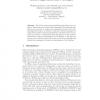Free Online Productivity Tools
i2Speak
i2Symbol
i2OCR
iTex2Img
iWeb2Print
iWeb2Shot
i2Type
iPdf2Split
iPdf2Merge
i2Bopomofo
i2Arabic
i2Style
i2Image
i2PDF
iLatex2Rtf
Sci2ools
148
click to vote
ERSHOV
2003
Springer
2003
Springer
Intersecting Classes and Prototypes
Abstract. The object-oriented programming language design space consists of class-based and prototype-based languages. Both language families have been shown to posses many advantages but also several disadvantages with respect to software construction. Hybrid languages featuring both prototype-based and class-based mechanisms have been proposed as a solution. Unfortunately these languages not only unify the advantages but also the disadvantages of both families. In this paper we propose a more intersectional point of view and propose a language that inherits the advantages but shuns the disadvantages of both families.
ERSHOV 2003 | Language Families | Object-oriented Programming Language | Prototype-based Languages |
Related Content
| Added | 06 Jul 2010 |
| Updated | 06 Jul 2010 |
| Type | Conference |
| Year | 2003 |
| Where | ERSHOV |
| Authors | Wolfgang De Meuter, Theo D'Hondt, Jessie Dedecker |
Comments (0)

